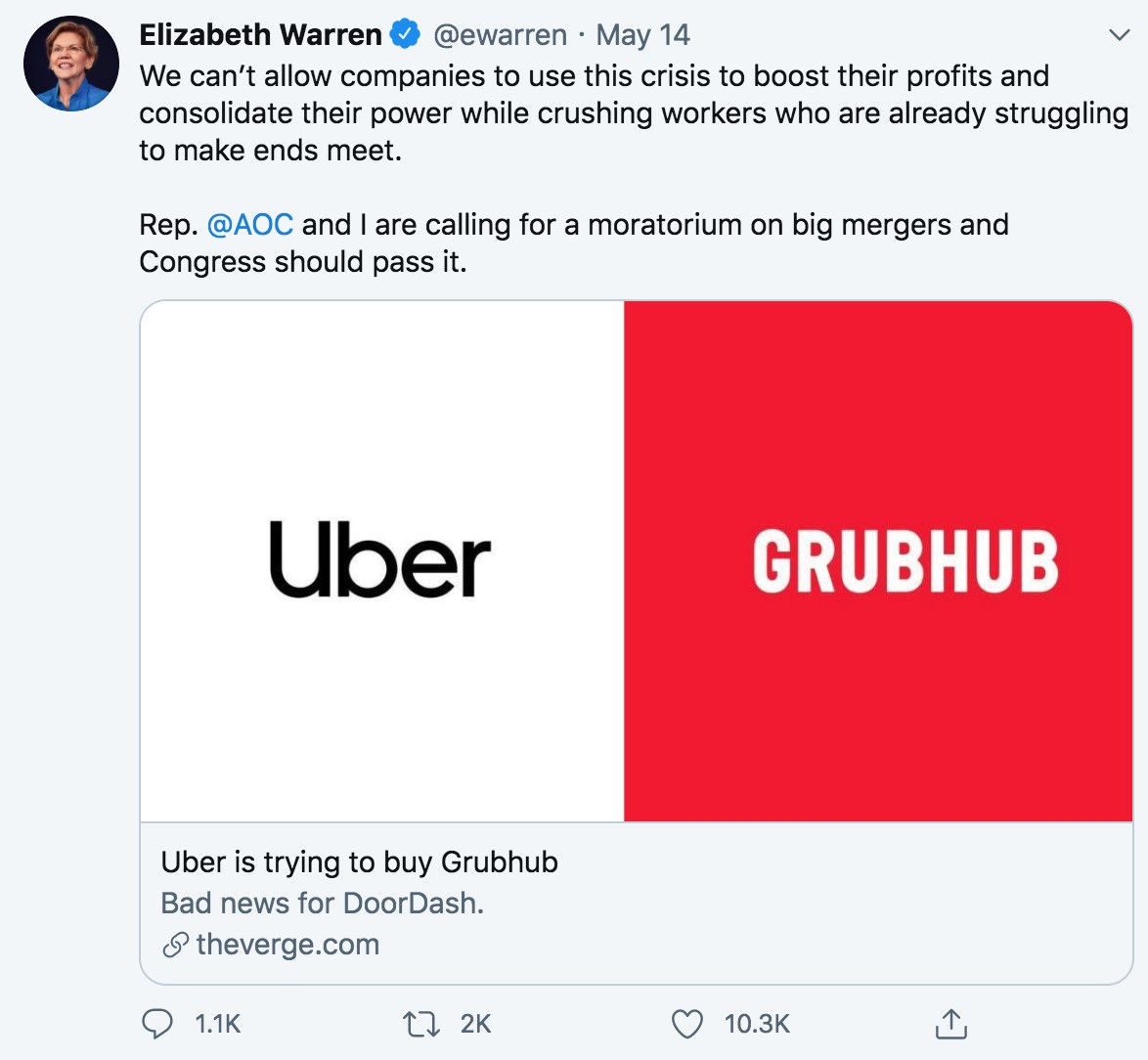- M&A creates economies of scale and can prevent bankruptcies
- An UBER-GRUB merger makes sense
- Progressive politicians say not so fast
The global pandemic in 2020 caused the most significant financial crisis since 2008. Many companies are struggling to survive after the US and global economies were thrust into a self-induced coma. Government bailouts and central bank stimulus have stabilized markets. Still, economic data and corporate earnings reflect the damage of a period where many companies have seen revenues decline, or in some cases, stop. Since March, over 38 million workers in the US applied for first-time unemployment benefits. In Q1, the US economy, which had been the envy of the world, contracted by almost 5%. The second-quarter GDP data will be far worse.
Companies are scrambling to address the new reality. Those that survive will need to learn to do more with less. Unemployment will remain high and could be in the double-digit percentage range for years. To address the post-Coronavirus environment, some companies will find it necessary to join forces. Uber Technologies Inc (UBER - Get Rating) and Grubhub Inc. (GRUB - Get Rating) have been in talks to combine their businesses. Some politicians in the US are against any merger activity in the current environment, which could create roadblocks for survival.
M&A creates economies of scale and can prevent bankruptcies
In the aftermath of the Coronavirus, as companies pick up the pieces from the event that rocked the US and global economies, we are likely to see businesses consolidate. Merger and acquisition activity will be accretive rather than dilutive for companies. Economies of scale come from a reduction of duplicative efforts.
Over the past months, the IPO market and M&A activity ground to a halt as companies focused on meeting the challenge of reduced or nonexistent revenues. At the same time, many have cut employees and expenses. As businesses reopen, fewer workers will be necessary. The high level of unemployment means that the addressable markets for many companies have declined. Sadly, a significant percentage of the thirty-eight plus million that are furloughed or lost jobs will not be back in the same positions, and many will remain unemployed.
Meanwhile, an increase in mergers could save jobs in the long run, as companies hobbled by the virus can remain solvent. Last week, the Fed released the minutes from its latest FOMC meeting. Members of the committee expressed concern that some businesses will not be viable in the post-Coronavirus world.
An UBER-GRUB merger makes sense
UBER’s business has suffered as the demand for ride and ridesharing services have plunged as people remained in their homes. Over the past months, the roads had emptied.

(Source: Barchart)
The chart highlights the decline from $41.86 in mid-February to $13.71 one month later, a drop of 67.2%. UBER recovered with the rest of the stock market over optimism that the worst of the virus is over. The shares closed at $34.60 on May 22. At the high, UBER shares were around the IPO price in May 2019. The Uber-eats service that delivers food had been a bright spot for the company. Social distancing guidelines closed most restaurants to the public, but many remained opened for take-out orders. UBER has a market cap of just over $60 billion.
GRUB is a company that directly competes with Uber-eats. GRUB limped into the global pandemic as its shares had been under pressure since September 2018.

(Source: Barchart)
GRUB came public in 2014 at $40 per share. The stock rose to a high of $149.35 in September 2018 and has been heading steadily lower. The stock hit a low at $29.35 in March. GRUB has made a significant comeback and was trading at $57.35 per share on May 22. While UBER was still below its IPO price from 2019, GRUB was above its offering price from 2014. On May 12, GRUB shares spiked to a high of $64.94 on the news it was in merger discussions with UBER. GRUB has a market cap of around $5.3 billion, one-tenth the size of UBER.
A merger between the two makes sense in the current environment. Some politicians have more than a problem with the marriage, claiming it would create a duopoly in the food delivery business.
Progressive politicians say not so fast
With the 2020 election season in full swing, the progressive wing of Democrats in the US is not supportive of a merger between UBER and GRUB or any M&A activity.

(Source: Twitter)
Senator Elizabeth Warren opposes the merger, and Congresswoman Alexandria Ocasio-Cortez is calling for a moratorium on all “big” mergers. The article on The Verge says that UBER and GRUB have 50% of the delivery app market. DoorDash has 35% and is not a publicly traded company.
The capital markets are efficient, and M&A activity in the current environment that creates economies of scale may result in some job losses but may save many more jobs in the long run. GRUB has been under financial pressure since long before the pandemic. A marriage with UBER could be the only route for survival. Pricing and service will determine the survival of companies. Politicians could be doing more harm than good when they interfere with business consolidation in the current environment.
Want More Great Investing Ideas?
9 “BUY THE DIP” Growth Stocks for 2020
7 “Safe-Haven” Dividend Stocks for Turbulent Times
UBER shares were trading at $35.07 per share on Tuesday morning, up $0.24 (+0.69%). Year-to-date, UBER has gained 17.92%, versus a -5.82% rise in the benchmark S&P 500 index during the same period.
About the Author: Andrew Hecht

Andy spent nearly 35 years on Wall Street and is a sought-after commodity and futures trader, an options expert and analyst. In addition to working with StockNews, he is a top ranked author on Seeking Alpha. Learn more about Andy’s background, along with links to his most recent articles. More...
More Resources for the Stocks in this Article
| Ticker | POWR Rating | Industry Rank | Rank in Industry |
| UBER | Get Rating | Get Rating | Get Rating |
| GRUB | Get Rating | Get Rating | Get Rating |






